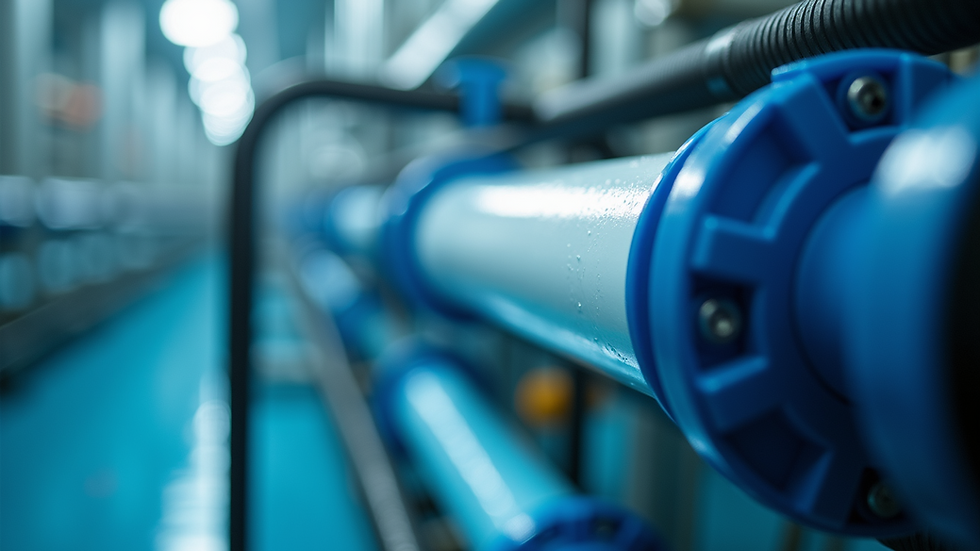The Role of Automation in Eco-Friendly Yachting
- Omri Farbstein

- Oct 27, 2025
- 4 min read
Yachting has long been associated with luxury and leisure, but as environmental concerns grow, the industry is shifting towards sustainability. Automation plays a crucial role in making yachting more eco-friendly. From energy management to waste reduction, automated systems help reduce the environmental footprint of yachts. One key innovation is the integration of an automatic water purifier, which ensures clean water supply while minimizing waste and energy use.
How Automation Enhances Eco-Friendly Yachting
Automation in yachting involves using smart technologies to optimize operations and reduce resource consumption. These systems monitor and control various yacht functions, such as propulsion, energy use, water treatment, and waste management. Here are some ways automation contributes to greener yachting:
Energy Efficiency: Automated energy management systems adjust power consumption based on real-time needs. They optimize battery use, solar panels, and generators to reduce fuel consumption and emissions.
Water Conservation: Smart water systems monitor usage and detect leaks, helping conserve freshwater onboard. Automated water purifiers provide clean water without the need for bottled alternatives.
Waste Reduction: Automated waste treatment systems process sewage and greywater onboard, reducing pollution and the need for shore disposal.
Navigation Optimization: Automated navigation tools plan routes that minimize fuel use and avoid sensitive marine areas.
By integrating these technologies, yachts can operate more sustainably without compromising comfort or performance.

The Importance of an Automatic Water Purifier in Sustainable Yachting
Water is a critical resource on any yacht, and managing it efficiently is essential for sustainability. Traditional water storage and purification methods often involve plastic bottles or energy-intensive processes. An automatic water purifier offers a smart solution by continuously filtering and purifying water onboard with minimal human intervention.
Benefits of an Automatic Water Purifier:
Reduces Plastic Waste: By providing clean drinking water directly from seawater or onboard tanks, it eliminates the need for single-use plastic bottles.
Energy Efficient: These systems use advanced filtration technologies that consume less power compared to conventional desalination or purification methods.
Convenience and Safety: Automated operation ensures consistent water quality without manual checks, reducing the risk of contamination.
Space Saving: Compact designs free up valuable storage space on yachts.
Installing an automatic water purifier is a practical step toward reducing environmental impact while enhancing onboard living standards.

Is a Tankless Water Purifier Better?
Tankless water purifiers are gaining popularity in marine applications due to their efficiency and compact design. Unlike traditional purifiers with storage tanks, tankless systems filter water on demand, offering several advantages:
Space Efficiency: Without bulky tanks, these purifiers save space, which is crucial on yachts where every inch counts.
Freshness: Water is purified as it is used, ensuring maximum freshness and reducing the risk of bacterial growth in stored water.
Energy Savings: Tankless systems typically consume less energy since they operate only when water is needed.
Lower Maintenance: Fewer components mean less maintenance and fewer chances of leaks or malfunctions.
However, tankless purifiers may have limitations in high-demand situations where large volumes of water are needed quickly. Choosing between tankless and tank-based systems depends on yacht size, water usage patterns, and specific needs.
Practical Recommendations for Implementing Automation in Yachting
To maximize the benefits of automation for eco-friendly yachting, consider the following actionable steps:
Assess Your Yacht’s Needs: Evaluate energy, water, and waste management requirements to identify which automated systems will have the greatest impact.
Invest in Integrated Systems: Choose automation solutions that can communicate and work together for optimal efficiency.
Prioritize Renewable Energy: Incorporate solar panels, wind turbines, or hybrid propulsion systems controlled by smart energy management.
Install an Automatic Water Purifier: Ensure a reliable supply of clean water while reducing plastic waste and energy use.
Regular Monitoring and Maintenance: Use automated monitoring tools to track system performance and schedule timely maintenance.
Educate Crew and Passengers: Promote sustainable practices onboard to complement technological solutions.
By following these recommendations, yacht owners and operators can significantly reduce their environmental footprint.
Future Trends in Eco-Friendly Yachting Automation
The future of yachting is increasingly digital and sustainable. Emerging trends include:
AI-Powered Systems: Artificial intelligence will enable smarter decision-making for energy use, route planning, and maintenance.
Advanced Water Technologies: Innovations in water purification and recycling will further reduce freshwater consumption.
Electric and Hybrid Propulsion: Automation will optimize battery management and charging from renewable sources.
Smart Waste Management: Automated sorting and treatment of waste will minimize pollution and improve recycling onboard.
Connectivity and Remote Control: Owners will be able to monitor and control yacht systems remotely, ensuring efficiency even when away.
These advancements will make eco-friendly yachting more accessible and effective, helping protect marine environments for future generations.

Embracing Automation for a Greener Yachting Experience
Automation is transforming yachting by making it more sustainable and efficient. Technologies like the automatic water purifier play a vital role in reducing waste and conserving resources. By adopting smart systems, yacht owners can enjoy luxury while minimizing their environmental impact. The future of yachting lies in innovation that respects the oceans and promotes responsible enjoyment of the sea.




